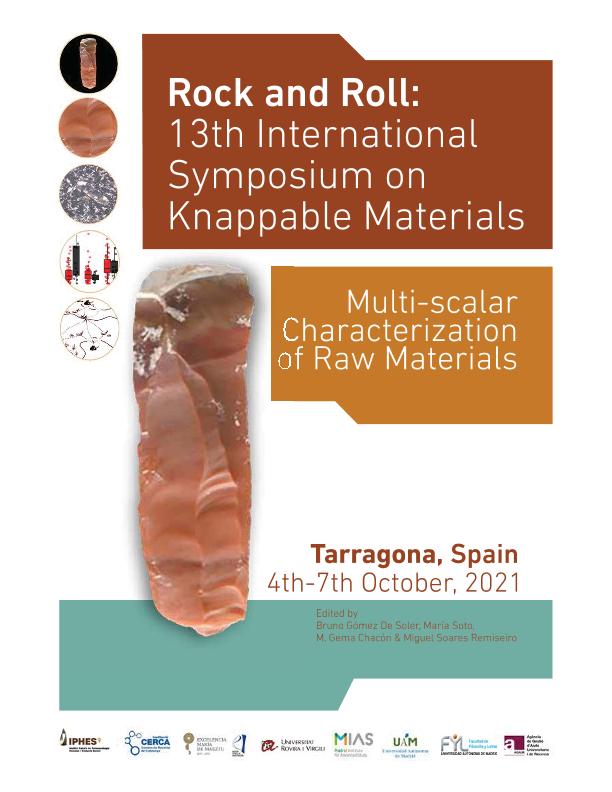Mostrar el registro sencillo del ítem
dc.contributor.author
Franco, Nora Viviana

dc.contributor.other
Gómez de Soler, Bruno
dc.contributor.other
Soto, María
dc.contributor.other
Chacón, M. Gema
dc.contributor.other
Soares Remiseiros, Miguel
dc.date.available
2023-04-13T11:30:11Z
dc.date.issued
2021
dc.identifier.citation
Is it possible to understand information transmission and residence patterns from the archaeological record? Some examples from Patagonia; Rock and Roll: 13th International Symposium on Knappable Materials; Tarragona; España; 2021; 214-214
dc.identifier.uri
http://hdl.handle.net/11336/193612
dc.description.abstract
The archaeological record is the product of successive human occupations, which can also involve different human groups. These groups take decisions which involve their own background and choices, which are related to the knowledge and distribution of resources, as well as to the existence of neighbors and symbolic aspects. Technological and raw material Information is transmitted through different ways along the life of different individuals. Variations in the way information is transmitted have been found out between people living close to each other. The question this paper deals with the possibility of their recognition. Can we, as archaeologists, be able to rec-ognize them, specially taking into account the cumulative nature of the archaeological record and the equifinality problems which are so frequent? The archaeological record is the product of successive human occupations, which can also involve different hu-man groups. Here we will focus on one case from the South of the Upper Santa Cruz river basin, South Patagonia, dated to the Late Holocene, which will be compared with other ex-amples from more to the south and north. We focus on technological, raw material and use-life variations in the more frequent tool types -endscrapers, side scrapers and knifes- and cores, as well as blanks which provide technological information. The pattern found out can be related to differences in information transmission between different tool types, but addition information is needed. To the north, the existence of higher variation in raw material availability as well as a more incomplete knowledge of the regional archaeological record do not allow, by the moment, to discuss these aspects.We believe that a good knowledge of the regional archaeological record and an under-standing of the regional lithic structure are essential to begin to discuss if the patterns we find out can be related to specific transmission and residence patterns, as well as to begin to understand if some choices can be related to symbolic aspects. The pos-sibility of the recognition of these patterns will also be related to the variability within the regional lithic structure.
dc.format
application/pdf
dc.language.iso
eng
dc.publisher
Institut Catalá de Paleoecología Humana
dc.rights
info:eu-repo/semantics/openAccess
dc.rights.uri
https://creativecommons.org/licenses/by-nc-sa/2.5/ar/
dc.subject
HUNTER-GATHERERS
dc.subject
PATAGONIA
dc.subject
INFORMATION TRANSMISSION
dc.subject
LITHICS
dc.subject.classification
Arqueología

dc.subject.classification
Historia y Arqueología

dc.subject.classification
HUMANIDADES

dc.title
Is it possible to understand information transmission and residence patterns from the archaeological record? Some examples from Patagonia
dc.type
info:eu-repo/semantics/publishedVersion
dc.type
info:eu-repo/semantics/conferenceObject
dc.type
info:ar-repo/semantics/documento de conferencia
dc.date.updated
2023-02-01T15:15:11Z
dc.journal.pagination
214-214
dc.journal.pais
España

dc.journal.ciudad
Tarragona
dc.description.fil
Fil: Franco, Nora Viviana. Consejo Nacional de Investigaciones Científicas y Técnicas. Oficina de Coordinación Administrativa Saavedra 15. Instituto Multidisciplinario de Historia y Ciencias Humanas; Argentina
dc.relation.alternativeid
info:eu-repo/semantics/altIdentifier/url/https://wwwa.fundacio.urv.cat/congressos/public/cng_media/ISKM2021/13thISKM_PROGRAM.pdf
dc.conicet.rol
Autor

dc.coverage
Internacional
dc.type.subtype
Simposio
dc.description.nombreEvento
Rock and Roll: 13th International Symposium on Knappable Materials
dc.date.evento
2021-10-04
dc.description.ciudadEvento
Tarragona
dc.description.paisEvento
España

dc.type.publicacion
Book
dc.description.institucionOrganizadora
Institut Catalá de Paleoecología Humana
dc.description.institucionOrganizadora
Centres de Recerca de Catalunya
dc.description.institucionOrganizadora
Excelencia María de Maetzu
dc.description.institucionOrganizadora
Agencia Estatal de Investigación
dc.description.institucionOrganizadora
Universitat Romira
dc.description.institucionOrganizadora
Madrid Institute for Advance Study
dc.source.libro
Rock and Roll: 13th International Symposium on Knappable Materials
dc.date.eventoHasta
2021-10-07
dc.type
Simposio
Archivos asociados
